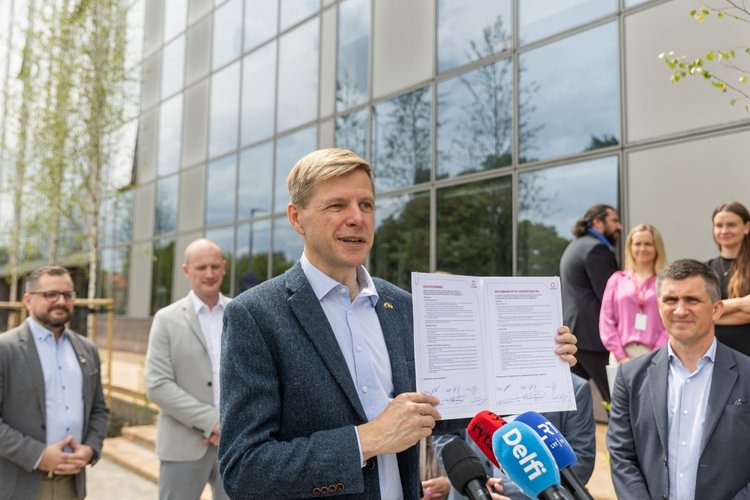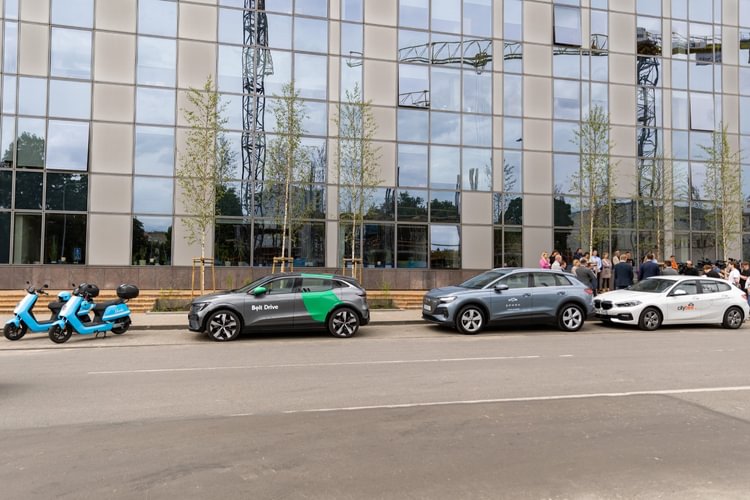Vilnius Forms Shared Mobility Cluster to Reduce Traffic and Endorse Sustainable Urban Traveling
Lithuanian capital Vilnius has set goals to promote car-sharing, increase sustainable travels, and reduce the number of cars in the city by urging residents to swap their personal vehicles with shared ones. As a car-sharing leader in Europe, the city cooperated with the city’s businesses to form a mobility cluster—Vilnius Shared Mobility Hub.
Vilnius, the capital of Lithuania, has collaborated with local businesses to create Vilnius Shared Mobility Hub—a mobility cluster aimed at boosting the city’s car-sharing services and economic innovations, as well as promoting sustainability by reducing the number of individual vehicles in the city.
Vilnius has been implementing car-sharing services for 10 years and counts around 1.5M shared car trips per year, making it the leader among other European cities. Almost 20% of Vilnius residents have used a car-sharing service at some point and the city has the largest car-sharing density in the region—800 vehicles per 1M residents.
Given that car-sharing has helped Vilnius to reduce its CO2 emissions by 2,200 tons in 2020, the new mobility cluster is expected to bolster the sustainable travels within the city as it has been estimated that one shared car equals 12 personal vehicles. Furthermore, car-sharing frees up parking spaces as personal cars are estimated to be parked 96% of the time. Shared vehicles also offer more safety since they are new and regularly maintained and reckless drivers are banned from using the service, therefore, the entire transport ecosystem is more secure.
Mobility cluster—to increase alternative traveling means
Vilnius Shared Mobility Hub is formed to further improve the car-sharing service integration with city development plans, aiming to increase the portion of shared trips in traveling statistics, boost the availability, safety, and efficiency of sharing services, and implement other sustainable economic innovations.
Remigijus Šimašius, Mayor of Vilnius, says the city has achieved leadership in car-sharing because of active involvement in seeking the most convenient solutions for the residents and visitors, and a constant search for active and innovative partners.
“Vilnius Shared Mobility Hub will not only enhance the car-sharing system but also open new possibilities of how to reshape the city’s image. Less space for personal cars will be needed, therefore allowing to transform the streets, making them greener with new trees and shrubs, scaling down the traffic,” added Mr. Šimašius. “As a car-sharing leader in Europe, Vilnius considers the mobility cluster to be another crucial milestone in encouraging other capitals and cities to use our good practices and make the region more environmentally conscious.”
Vilnius Shared Mobility Hub unites Vilnius City Municipality, CityBee, the pioneer of shared mobility services in Lithuania, SPARK, the first fully electric car-sharing company in the country, Bolt, an international mobility company, Skok, an electric scooter sharing platform, “Susisiekimo paslaugos”, a municipal enterprise organizing public transportation in Vilnius, and Go Vilnius, the official tourism and business development agency of Vilnius.
According to the collaborators, the cluster will facilitate creating a platform where both the city and the businesses could solve mobility challenges, seek for innovative solutions to increase the appeal for alternative mobile services, reduce the traffic jams and parking issues, at the same time prompting more sustainable and environmentally-friendly travels.
Another step to further the city’s sustainable mobility agenda
The capital of Lithuania trusts the cooperation with the businesses and the resulting mobility cluster will contribute to achieving the goals of the city’s sustainable mobility plan: to reduce personal vehicles in the city, to allow shared travels to exceed the 2% mark of all travels, to decrease the use of personal vehicles by 30%, and to promote public transportation as well as alternative traveling means like shared cars, electric scooters, bicycles, etc. The proposed goals are expected to be met by 2030.
Vilnius is also successfully implementing an electric scooter sharing system with 150K users in 2021. Taking the safety precautions regarding electric scooter use, such as urging the users to park them responsibly and removing them from nightlife areas to avoid drunk driving, the city cooperates with 5 scooter service providers to make this alternative traveling means more accessible to the residents and visitors.


